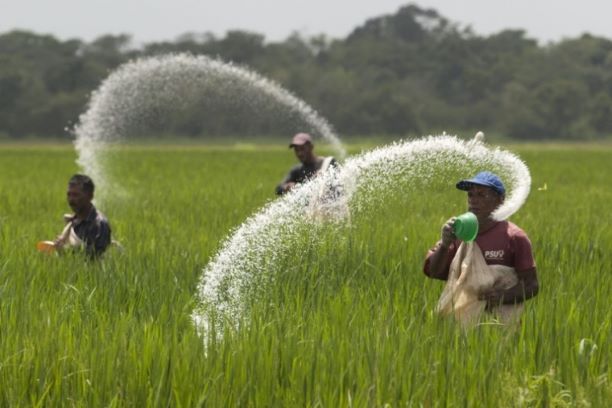

While methane emission from paddy cultivation has shown a slow and slight decline, the lopsided use of nitrogen-based fertiliser in India has released more and more of nitrous oxide (N2O) into the atmosphere in the past three decades, a study has found.
The research by Jadavpur University, Kolkata and Thailand’s Asian Institute of Technology scientists reveal that “nitrous oxide emission from nitrogen-fertilizer use increases by around 358 percent, growing at a “statistically significant rate of 5100 tonnes per year” from 1980-1981 to 2014-2015.
The total non-carbon dioxide emission from cropland-based agricultural activities, mainly due to nitrous oxide, has gone up by approximately 49 percent in the past three decades, according to the analysis authored by Shreya Some, Joyashree Roy and Arpita Ghose.
“The marginal decline (a rate of 200 tonnes per year) in methane emission is mainly due to a switch to less water-intensive paddy cultivation under flooded land conditions. Irrigation facilities have also improved, coupled with technological advances,” Joyashree Roy said.
The rise in non-CO2 emission from increasing use of nitrogen-based fertiliser could be clearly attributed to the link between fertiliser pricing policy and disproportionately higher use of N-fertiliser going beyond officially prescribed ratios, the authors write in the study.
Nitrous oxide emission from agricultural soil is due to the natural biochemical process in the nitrogen cycle. Application of nitrogen-based fertilizers stimulates microbes in the soil to convert nitrogen to nitrous oxide at a faster rate than normal. So, controlling N-fertiliser use can help in the reduction of N2O emission.
As against the ideal nitrogen (N), phosphate (P) and potassium (K) ratio of 4:2:1 (around 57 percent of N, 29 percent of P and 14 percent of K) for India, the ratio during the study period worked out to be 6.5: 2.5:1.
The study pointed out that India’s nutrient-based subsidy (NBS) policy led to an immediate rise in the prices of P and K fertilizers leading to a decrease in their use, on the other hand, more N fertilizer was used.
“So fertilizer policy interventions have played a very important role in driving farmers’ behavior towards fertilizer use which means that policy processes need to match with the NPK balance prescribed so farmers apply in right proportions as per prescribed standards. This would have mitigating effects on emissions and soil health,” Roy added.
The study also showed a correlation of drought years with decrease N-fertiliser and subsequently NO2 emissions.
If we look at the IPCC 1.5 degree Celsius scenario the NO2 component is not large compared to CO2, but it is also not negligible. Nitrous oxide does not have an immediate local environmental impact. On a global scale however, it does contribute to global warming and is the third most important greenhouse gas.
One tonne of nitrous oxide is equivalent to 298 tonnes of carbon dioxide. Nitrous oxide has an atmospheric lifetime of 110 years. The process that removes nitrous oxide from the atmosphere also depletes ozone. So nitrous oxide is not only a greenhouse gas, but also an ozone destroyer. Therefore despite its name as laughing gas, it is no laughing matter.
India is undergoing a significant influx of urban migration and a reclassification of rural areas,…
India’s quest toward green hydrogen economy received a significant boost with a strategic MoU between…
A new report by S&P Global has revealed that India’s growing biofuels industry is emerging…
In a significant breakthrough for India’s renewable energy and dairy sectors, dairy major Amul has…
Renewable energy conglomerate Anaergia Inc, through its subsidiary, Anaergia S.r.l., entered into a contract with…
Reliance Industries Ltd (RIL) Chairman Mukesh Ambani has announced a massive ₹75,000 crore investment in…